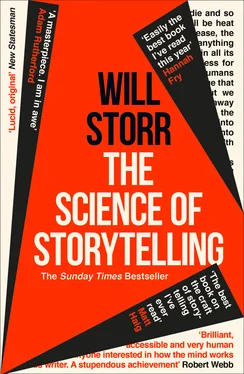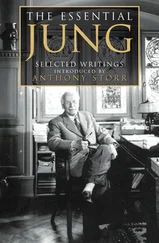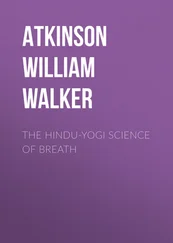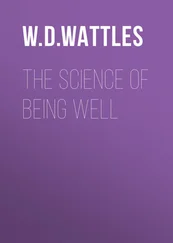What follows is an attempt to make sense of some of what generations of brilliant story theorists have discovered in the face of what equally brilliant women and men in the sciences have come to know. I am infinitely indebted to them all.
Will Storr
CHAPTER ONE:
CREATING A WORLD

Where does a story begin? Well, where does anything begin? At the beginning, of course. Alright then: Charles Foster Kane was born in Little Salem, Colorado, USA, in 1862. His mother was Mary Kane, his father was Thomas Kane. Mary Kane ran a boarding house …
It’s not working. A birth may be the beginning of a life and, if the brain was a data processor, that’s surely where our tale would start. But raw biographical data have little meaning to the storytelling brain. What it desires – what it insists upon, in exchange for the rare gift of its attention – is something else.
Many stories begin with a moment of unexpected change. And that’s how they continue too. Whether it’s a sixty-word tabloid piece about a TV star’s tiara falling off or a 350,000-word epic such as Anna Karenina , every story you’ll ever hear amounts to ‘something changed’. Change is endlessly fascinating to brains. ‘Almost all perception is based on the detection of change’ says the neuroscientist Professor Sophie Scott. ‘Our perceptual systems basically don’t work unless there are changes to detect.’ In a stable environment, the brain is relatively calm. But when it detects change, that event is immediately registered as a surge of neural activity.
It’s from such neural activity that your experience of life emerges. Everything you’ve ever seen and thought; everyone you’ve loved and hated; every secret you’ve kept, every dream you’ve pursued, every sunset, every dawn, every pain, bliss, taste and longing – it’s all a creative product of storms of information that loop and flow around your brain’s distant territories. That 1.2-kg lump of greyish-pink computational jelly you keep between your ears might fit comfortably in two cupped hands but, taken on its own scale, it’s vast beyond comprehension. You have 86 billion brain cells or ‘neurons’ and every one of them is as complex as a city. Signals flow between them at speeds of up to 120 metres per second. They travel along 150,000 to 180,000 kms of synaptic wiring enough to wrap around the planet four times.
But what’s all this neural power for? Evolutionary theory tells us our purpose is to survive and reproduce. These are complex aims, not least reproduction, which, for humans, means manipulating what potential mates think of us. Convincing a member of the opposite sex that we’re a desirable mate is a challenge that requires a deep understanding of social concepts such as attraction, status, reputation and rituals of courting. Ultimately, then, we could say the mission of the brain is this: control. Brains have to perceive the physical environment and the people that surround it in order to control them. It’s by learning how to control the world that they get what they want.
Control is why brains are on constant alert for the unexpected. Unexpected change is a portal through which danger arrives to swipe at our throats. Paradoxically, however, change is also an opportunity. It’s the crack in the universe through which the future arrives. Change is hope. Change is promise. It’s our winding path to a more successful tomorrow. When unexpected change strikes we want to know, what does it mean? Is this change for the good or the bad? Unexpected change makes us curious, and curious is how we should feel in the opening movements of an effective story.
Now think of your face, not as a face, but as a machine that’s been formed by millions of years of evolution for the detection of change. There’s barely a space on it that isn’t somehow dedicated to the job. You’re walking down the street, thinking about nothing in particular, and there’s unexpected change – there’s a bang; someone calls your name. You stop. Your internal monologue ceases. Your powers of attention switch on. You turn that amazing change-detecting machine in its direction to answer the question, ‘What’s happening?’
This is what storytellers do. They create moments of unexpected change that seize the attention of their protagonists and, by extension, their readers and viewers. Those who’ve tried to unravel the secrets of story have long known about the significance of change. Aristotle argued that ‘peripeteia’, a dramatic turning point, is one of the most powerful moments in drama, whilst the story theorist and celebrated commissioner of screen drama John Yorke has written that ‘the image every TV director in fact or fiction always looks for is the close-up of the human face as it registers change.’
These changeful moments are so important, they’re often packed into a story’s first sentences:
That Spot! He hasn’t eaten his supper. Where can he be?
( Eric Hill, Where’s Spot?)
Where’s Papa going with that ax?
( E. B. White, Charlotte’s Web)
When I wake up, the other side of the bed is cold.
( Suzanne Collins, The Hunger Games)
These openers create curiosity by describing specific moments of change. But they also hint darkly at troubling change to come. Could Spot be under a bus? Where is that man going with that axe? The threat of change is also a highly effective technique for arousing curiosity. The director Alfred Hitchcock, who was a master at alarming brains by threatening that unexpected change was looming, went as far as to say, ‘There’s no terror in the bang, only in the anticipation of it.’
But threatening change doesn’t have to be as overt as a psycho’s knife behind a shower curtain.
Mr and Mrs Dursley, of number four Privet Drive, were proud to say that they were perfectly normal, thank you very much. ( J. K. Rowling, Harry Potter and the Philosopher’s Stone)
Rowling’s line is wonderfully pregnant with the threat of change. Experienced readers know something is about to pop the rather self-satisfied world of the Dursleys. This opener uses the same technique Jane Austen employs in Emma , which famously begins:
Emma Woodhouse, handsome, clever and rich, with a comfortable home and a happy disposition, seemed to unite some of the best blessings of existence; and had lived nearly twenty-one years in the world with very little to distress or vex her.
As Austen’s line suggests, using moments of change or the threat of change in opening sentences isn’t some hack trick for children’s authors. Here’s the start of Hanif Kureishi’s literary novel Intimacy :
It is the saddest night, for I am leaving and not coming back.
Here’s how Donna Tartt’s The Secret History begins:
The snow in the mountains was melting and Bunny had been dead for several weeks before we came to understand the gravity of our situation.
Here’s Albert Camus starting The Outsider :
Mother died today. Or yesterday. I don’t know.
And here’s Jonathan Franzen, opening his literary masterpiece The Corrections in precisely the same way that Eric Hill opened Where’s Spot?
The madness of an autumn prairie cold front coming through. You could feel it: something terrible was going to happen.
Читать дальше













